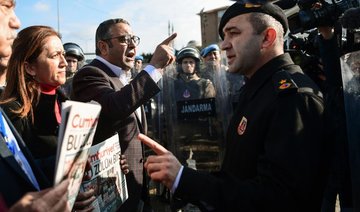SILIVRI, Turkey: Two Turkish journalists walked free from prison on Friday after over a year behind bars in the trial on terror-related charges of staff from the opposition Cumhuriyet newspaper.
Cumhuriyet’s Editor in Chief Murat Sabuncu and investigative reporter Ahmet Sik were ordered to be freed by the judge after a marathon day-long hearing and later walked free from jail.
However, they remain under charge and on trial. One more detained suspect, the paper’s chairman, Akin Atalay, was ordered to stay in jail.
The three were the last remaining suspects in the case to be held behind bars ahead of a final verdict, leaving Atalay the sole suspect still behind bars.
A total of 17 staff from Cumhuriyet (Republic) face terror charges in the trial, which opened on July 24. Others have been gradually freed over the last year. It is still not clear when the final verdict will be announced.
The next hearing in the trial was set for March 16 and the suspects still face up to 43 years in prison if convicted.
Sabuncu and Atalay have spent the last 495 days in jail and Sik, who was detained a little after the initial wave of arrests, 434 days.
The decision to release Sabuncu and Sik, delivered in the courthouse in Silivri outside Istanbul — part of a complex that also contains the prison where they are held — was greeted with cheers from supporters in the courtroom. Sik could be seen weeping with emotion.
Also present were the defendants who were released last year after long stints in jail but also remain charged, including cartoonist Musa Kart and columnist Kadri Gursel.
Sik, a staunch critic of Erdogan, said after walking free from Silivri jail there could be no celebration as Atalay remained in jail.
“I prefer you to be frustrated because frustration will help us stand tall... today is not a day to be happy.”
Taking aim at the government, he added: “I assure you that day will come when this Mafia sultanate comes to an end.”
Sabuncu added: “Turkey’s problems are not resolved just because we are set free.
“As journalists, our mission is to do our job fearlessly as we did before.”
Amnesty International’s Europe Director, Gauri van Gulik said the releases were “long overdue” and provided a “glimmer of hope” in a country she described as the “biggest jailer of journalists in the world.”
The latest hearing came a day after an Istanbul court sentenced 25 journalists to prison terms of up to seven -and-a-half years over links to the group of US-based preacher Fethullah Gulen who is blamed by Turkey for the 2016 failed coup against Erdogan.
Dozens of journalists have been detained in the wake of the coup bid, causing international concern.
The Cumhuriyet staff are charged with supporting through their coverage three organizations Turkey views as terror groups — the Kurdistan Workers’ Party (PKK), the ultra-left Revolutionary People’s Liberation Party-Front (DHKP-C), and the Gulen movement.
In court, various witnesses gave statements, including former Cumhuriyet journalist Altan Oymen who was once briefly a leader of the Republican People’s Party (CHP) and rubbished any idea the paper had backed Gulen.
“The allegations are unimaginable,” he said, adding it was Cumhuriyet, which had properly reported on the activities of Gulen.
Supporters say the charges are absurd, noting that the outlawed groups cited in the indictment are themselves at odds with each other.
Indeed, Sik is seen as one of Turkey’s most incisive critics of the Gulen movement and in 2011 wrote an explosive book “The Imam’s Army” exposing the grip the group had on key Turkish institutions.
In a separate development, Turkey’s top appeals court quashed the verdict of Cumhuriyet’s former Editor in Chief Can Dundar who was sentenced to five years and 10 months in jail on charges of revealing state secrets in 2016.
It ruled he should face an even more serious charge of espionage in a new trial and risk a longer prison term of up to 20 years. Dundar has fled Turkey and is now based in Germany.
























